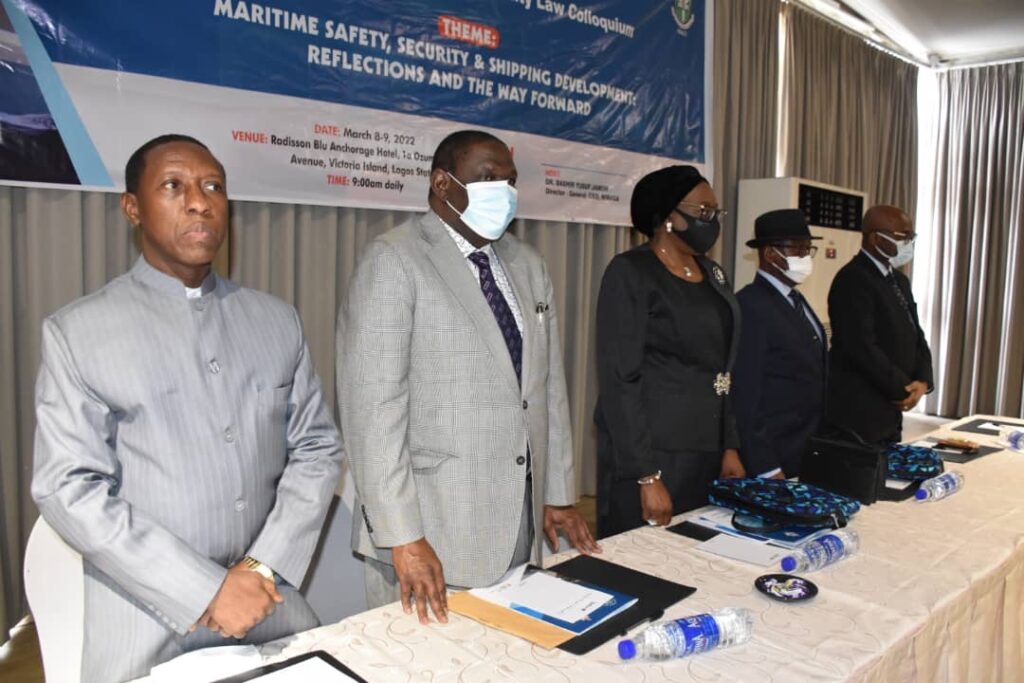In a bid to ensure that justice and democracy continue to shape the future of Nigerians, Judges and Prosecutors have continued to hold conferences and summits at various levels in order to ensure that they play their role as judiciary effectively. One of such meetings is the NIMASA Strategic Admiralty Colloquium for Judges and Prosecutors of which the Director-General of the Nigerian Institute of Advanced Legal Studies, Prof. M. T. Ladan was present amongst other legal practitioners.

Read his opening remark at the event:
OPENING REMARKS BY THE DIRECTOR-GENERAL OF NIALS, PROF. M. T. LADAN (PhD, HUBERT HUMPHREY FELLOW, USA) AT THE 2ND NIMASA STRATEGIC ADMIRALTY COLLOQUIUM FOR JUDGES AND PROSECUTORS ON THE THEME MARITIME SAFETY, SECURITY AND SHIPPING DEVELOPMENT: – REFLECTIONS AND THE WAY FORWARD
ORGANISED BY THE NIGERIAN MARITIME ADMINISTRATION AND SAFETY AGENCY (NIMASA) AND FACILITATED BY THE NIGERIAN INSTITUTE OF ADVANCED LEGAL STUDIES (NIALS)
HELD AT RADISSON BLU ANCHORAGE HOTEL VICTORIA ISLAND, LAGOS ON THE 8-9TH MARCH, 2022
PROTOCOL:- All Protocols already established are duly observed. On behalf of the Governing Council and Management of the Nigerian Institute of Advanced Legal Studies (NIALS) , I would like to welcome our eminent jurists and distinguished experts and to express our profound gratitude to the DG and management staff of NIMASA and the National Judicial Institute for sustaining our collaboration on this strategic colloquium series ( which started years back as a seminar until April 2021 when it was refocused to be a colloquium).
My Lords, distinguished experts, ladies and gentlemen, the choice of this year’s theme:- ” Maritime Safety, Security and Shipping Development:- Reflections and the Way Forward”, was necessitated by the obvious fact that in February 2020 we x-rayed the 1st stand-alone Anti-sea piracy and maritime crimes law in the entire Gulf of Guinea (Nigeria’s 2019 Suppression of Piracy and Other Maritime Offenses Act:- the SPOMO Act), identified the loopholes in the infant law and concluded that despite its teething problem, it remains a vital tool for accelerating and achieving safe and secure shipping in Nigeria.
My Lords, distinguished participants, in April 2021 the maiden colloquium (or the NIMASA/NIALS 10th Admiralty Law Proceedings) explored the critical role of the judiciary and law enforcement agencies in achieving NIMASA’ TRIPOD-S initiative ( Maritime Safety, Security and Shipping Development) within its deep blue project in Nigeria and the Gulf of Guinea, and concluded that, unless the Member States in the Gulf of Guinea region step up prosecution efforts and bring suspected pirates to justice, the region will remain the world’s piracy hotspot.
My Lords, distinguished participants, I am happy to report that 2 years after the coming into force of the SPOMO Act, the Federal High Court, Ikoyi, sentenced ten pirates to 12 years imprisonment each with a 250,000 naira fine on each count for the hijack of a merchant’s vessel in May 2020.
Similarly, in July.
2021, it was reported that s Togolese High Court convicted nine (9) pirates, following an attack on a tanker in May 2019 and sentenced one of the pirates to 15 years in prison while the rest were each sentenced to 12 years in prison.
Distinguished participants, compared to the year 2020, 2021 was a much better year for both Nigeria and the Gulf of Guinea as well as the global maritime community in dealing with piracy and other maritime crimes. Eg., according to the International Maritime Bureau (IBM) report, the number of pirate attacks and kidnapped seafarers in the Gulf of Guinea region has dropped significantly. In Q4 of 2020 about 23 attacks were made against merchant ships trading in the region while 50 seafarers were kidnapped. In Q4 of 2021, the numbers dropped to 7 attacks and 20 kidnappings.
My Lords, the region recorded 34 incidents of maritime piracy and armed robbery at sea in 2021, a sharp drop from 81 in 2020. While kidnappings at sea dropped by 55% in 2021, the region continues to account for all kidnapping incidents globally, with 57 crew taken in 7 separate incidents. The decline of piracy incidents in the Gulf of Guinea also led to the overall global reduction in reported incidents in 2021:- with 132 incidents of piracy and armed robbery against ships across the globe, the lowest recorded level since 1994. However, the Gulf of Guinea which remains the world’s privacy hotspot is home to Nigeria, whose economy generates more than 70% of the seaborne trade in West Africa and the Gulf of Guinea, because about 90% of global trade is carried out by the international shipping industry for import/export of goods.
Through this strategic colloquium, we wish to enhance the capacity of, and remind our, justice sector actors, that we will all prosper when the seas around us are safe, secure, and free for all to use and exploit natural resources, promote trade and investment, tourism, marine science and technology, maritime transport, infrastructure development, sustain fisheries and protection of the marine environment.
Through this colloquium we hope to build a greater understanding of the common challenges of maritime safety and security and how SPOMO Act 2019 seeks to promote synergy among justice sector actors (judges, prosecutors, anti-corruption agencies, security and Law enforcement agencies to effectively respond to the multiple challenges earlier highlighted).
Finally, the Joint NIMASA, NIALS, and NJI Organizing Committee have carefully produced for us guidance notes for chairpersons, panelists, resource persons to enable us to make judicious use of our time, encourage more interactive sessions than the dominant lecture approach, to share experiences and strategies on how best to implement the SPOMO Act, 2019 and other relevant investments as well as the Deep Blue Project.
In conclusion, timelines in justice dispensation, is critical to realizing the potentials of the maritime sector. This is to enable investors trust our judicial process. The more time taken on a case, the more investment opportunities are lost. Hence efficient and timely dispensation of justice in maritime-related cases will boost stakeholders and investor confidence in the judicial system.
Thank you for listening.